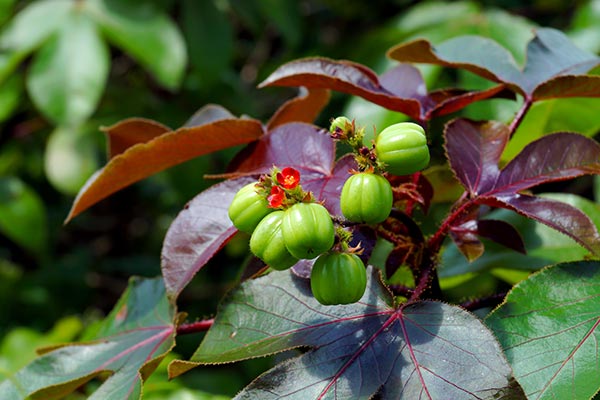
Five Plasmodium parasites are known to infect humans: P. falciparum, P. vivax, P. ovale, P. malariae and P. knowlesi. P. falciparum is the parasite that causes severe infections if not treated immediately, while P. knowlesi, a parasite that naturally infects macaques, is the only source of zoonotic, or animal-to-human-transmitted, malaria.
Malaria can cause severe and life-threatening symptoms, particularly the loss of red blood cells. These symptoms manifest themselves 10 days to four weeks after infection. Besides fever and flu-like illness, malaria may also cause nausea, vomiting, diarrhea, anemia and jaundice. If not promptly treated, malaria can lead to kidney failure, seizures, mental confusion, coma and death.
In a recent study, researchers at Nnamdi Azikiwe University in Nigeria looked for scientific basis for the use of Jatropha gossypiifolia, commonly known as bellyache bush, as a natural antimalarial medicine. The different parts of the plant are used to make traditional remedies for a variety of ailments, such as diarrhea, stomach ache, heart problems, parasitic infections and venereal diseases.
Using mice infected by P. berghei, a parasite that causes malaria-like symptoms in rodents, the researchers evaluated the antiplasmodial and antimalarial activities of extracts and fractions obtained from the leaves of bellyache bush. They reported their findings in an article published in the Journal of Medicinal Plants Research.
The bellyache bush is a safe alternative medicine for malaria
J. gossypiifolia is a flowering and fruit-bearing shrub that's native to South America. It can also be found in African regions where there is a distinct dry season. Once widely grown as an ornamental plant, bellyache bush has now become a noxious weed in some countries like Australia, where it has been reported to form dense thickets in areas with degraded pastures, disturbed river frontages and old settlements.
The fruits, leaves and seed oil of bellyache bush are popular ingredients of folk medicines. In Costa Rica, the whole plant is used for cancer treatment. In Ghana, the pith of old bellyache bush stems is used to relieve headaches. The fruits and seeds of the plant are also boiled to make medicine for stomach aches. A decoction made with bellyache bush leaves is used to cleanse the blood and treat heart problems and indigestion. Its seed oil, on the other hand, is a powerful purgative and emetic that can help expel internal parasites.
For their study, the researchers analyzed the phytochemical composition, physicochemical properties and median lethal dose (LD50) of bellyache bush leaf extracts and fractions. Using 50 P. berghei-infected mice, they also evaluated the antimalarial and curative activities of its ethanol leaf extracts and fractions. (Related: Purple mangosteen found to be a powerful remedy for malaria.)
Phytochemical analysis revealed that the leaves contain a variety of plant compounds, such as tannins, saponins, phlobatannins, alkaloids, flavonoids, terpenoids and cardiac glycosides. Bellybush ache leaf extracts have an LD50 of 4,472.14 mg/kg.
On the 28th day of treatment, the ethanol leaf extract (500 mg/kg) caused significant increases in alanine transaminase (ALT), alanine phosphatase (ALP) and aspartate aminotransferase (AST), indicating that it can cause liver injury when administered at high doses for prolonged periods.
The researchers also reported that the crude extract (50 to 200 mg/kg) of bellyache bush showed moderate prophylactic and significant curative activities on days 4 and 7, and the mean survival time of treated mice was comparable to that of mice treated with the malaria drug, quinine, at 100 mg/kg.
Bellyache bush leaf extracts and fractions also exhibited moderate to good prophylactic (preventive) and curative effects against symptoms caused by P. berghei infection, with the ethyl acetate fraction giving the best results.
Based on these findings, the researchers concluded that bellyache bush has good antiplasmodial activity and is safe to use as a natural antimalarial medicine.
Sources include:
Please contact us for more information.























